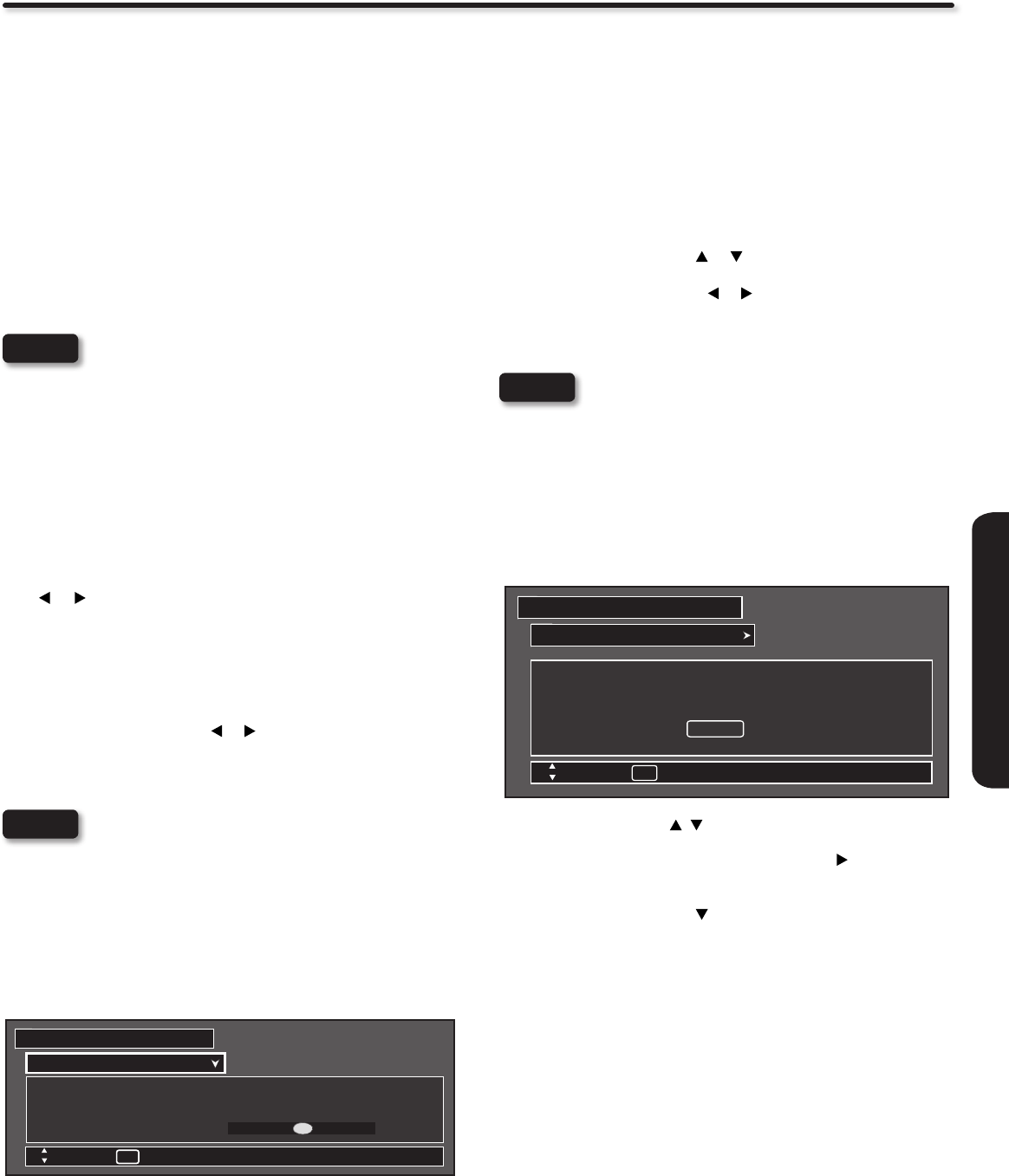
31
ON-SCREEN DISPLAY
Mode
Manually select the Aspect Ratio. There are different aspect
ratio available according with the signal in use. See page 57.
Vertical Position
This function allows you to move the picture up and down when
the aspect mode is 4:3 EXPANDED/ZOOM1/ZOOM2 or 16:9
ZOOM. For example, it will be useful for centering the picture
if you want to see sports scores or news tickers. Adjustable
range is -10 (video center is toward bottom of screen) to +10
(video is toward top of screen).
Use the CURSOR PAD
1. or to select menu item.
Press the CURSOR PAD 2. or to adjust the function.
Press the EXIT button to quit the MENU, or select ASPECT to 3.
return to the previous menu.
Vertical Position will not be available in 4:3 Standard •
and 16:9 Standard modes.
Vertical Position setting returns to “0” automatically •
after the TV is turned off.
Reset Video Settings
This function allows you to Reset the Video Menu Settings of the
present input and return it to the Dynamic video mode if set to
RETAIL Energy Saving Mode and to Day video mode when HOME
Energy Saving Mode is used (refer to page 41).
Move
SEL
Return
Reset Video Settings
Video
Select “Reset” to return Video settings on this
input to the original factory settings.
Reset
Use CURSOR PAD 1. , to highlight functions.
Press the SELECT button or CURSOR PAD 2. to select Reset
Video Settings.
Use the CURSOR PAD
3. to access the Reset softkey.
Press the SELECT button to Reset the Video Settings.4.
You can customize each of the Video Inputs to your preference to
increase viewing performance and pleasure, depending upon the
video program being viewed. If RESET is selected, only the selected
Input will reset to the initial conditions as explained above.
If RESET is selected in Input 1, only Input 1 will return to factory
conditions.
Auto Movie Mode
The AUTO MOVIE MODE function turns ON or OFF the 3:2
pulldown detection feature. Theatrical movies are shot on lm at 24
frames or still pictures per second, instead of 30 frames or 60 elds
like video. When lm is transferred to video for television viewing,
the disparity between the two frame rates must be reconciled. This
involves a process known as 3:2 pulldown. When AUTO MOVIE
MODE is set to ON your Hitachi Plasma Television will activate
the circuitry for this special feature to improve video performance
when watching interlace format lm based sources. Set to OFF to
desactivate this feature.
Color Space
The COLOR SPACE function allows you to select between two
color modes. Select VIBRANT for highly saturated (brighter) colors
or Auto STD/x.v.Color™ for more natural colors.
x.v.Color™ is only available for HDMI/Component
Input and will provide a wide color range.
Cinema48™
This menu is active for HDMI with 24p or 24 frame per second
inputs only. When the input signal is 24fps (Movies), a process
called 2-2 pulldown operates and the signal will be converted to
48fps creating a beautiful and smooth picture that is very cinema
like.
Lip Sync
Selecting this feature will allow you to synchronize the audio with
the picture signal on a digital or analog source. Use the CURSOR
PAD
or to synchronize the picture and the audio signal. The
default value is set to 0.
Black Side Panel
The BLACK SIDE PANEL function turns the gray side bars from
gray to black when watching 4:3 signals in Standard mode.
Press the CURSOR PAD 1. or to set to ON or OFF.
Press EXIT to quit menu or select SET BLACK SIDE PANEL 2.
to return to the previous menu.
Using the BLACK SIDE PANEL feature stops the
•
aging of the screen in the black panel area. If used
for extended periods of time, the center of the screen
will become darker and the black side panel area
will be brighter when a full screen video is viewed.
The Side Panel setting will default to grey when the •
TV is turned off to minimize uneven aging.
Aspect
Use this function to select the Picture Format Aspect Ratio.
Aspect
Auto Aspect : On
Mode : 16:9 Standard1
Vertical Position : 0
Video
Move
SEL
Return
Auto Aspect
Automatically adjust the Aspect Ratio depending on the input
signal to ll the screen.
NOTE
Video
NOTES
NOTES
